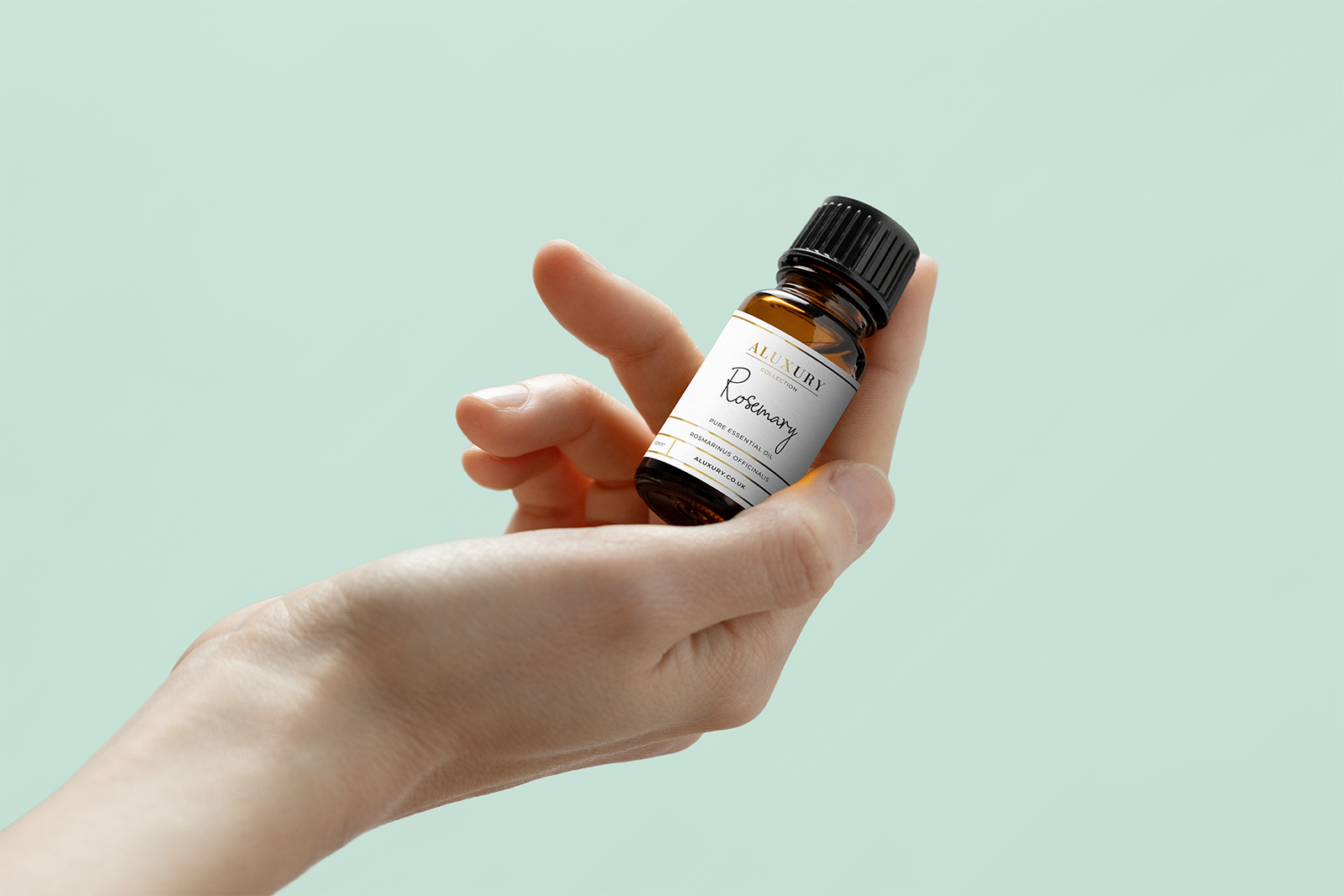Nature's Ancient Wonder with Modern Science Backing
Rosemary essential oil, derived from the aromatic herb Rosmarinus officinalis, has been treasured for centuries across diverse cultures. This fragrant Mediterranean region shrub isn't just a culinary staple—it's a powerhouse of potential therapeutic benefits supported by both traditional wisdom and emerging scientific research. From cognitive enhancement to hair growth promotion, stress reduction to pain relief, rosemary essential oil offers a remarkable range of applications worth exploring.
A Rich Historical Legacy
Long before modern science began investigating its properties, rosemary was held in high regard by ancient civilizations. The Greeks, Egyptians, and Romans utilized this versatile herb for memory enhancement, as incense, for protection, and even as a symbol in ceremonies related to life and death. Throughout history, traditional healers employed rosemary for a variety of ailments, including muscle pain, headaches, digestive issues, and emotional distress.
Folk medicine documented rosemary's use for "improving memory, relieving muscle pain and spasms, stimulating hair growth, and supporting the circulatory and nervous systems" according to historical records. It was also traditionally used to "address headaches, migraines, insomnia, emotional upset, and depression," showing just how versatile this plant has been considered throughout human history.
Rosmarinus officinalis has been used in herbal medicine systems worldwide, with practitioners recognizing its potential to alleviate various conditions. In folk medicine, rosemary was utilized for "dysmenorrhea, stomachache, epilepsy, rheumatic pain, spasms, nervous agitation, and mental fatigue," demonstrating the breadth of traditional applications for this remarkable plant.
Today, high-quality essential oils like rosemary are gaining renewed attention as people seek natural alternatives for wellness support. Let's explore what modern science tells us about this ancient remedy.
Cognitive Function: Memory and Mental Clarity
One of the most intriguing benefits of rosemary essential oil is its potential positive impact on cognitive function. The association between rosemary and memory enhancement has persisted since ancient times, and contemporary research is beginning to uncover the mechanisms behind these traditional claims.
When inhaled, certain compounds in rosemary oil may help prevent the breakdown of acetylcholine, a crucial neurotransmitter involved in thinking, concentration, and memory. Studies have demonstrated that inhaling rosemary oil allows compounds to enter the bloodstream through the respiratory system, with increased blood levels of 1,8-cineole—a key component of rosemary oil—being observed.
Research conducted on healthy adults has shown that exposure to diffused rosemary aroma can lead to improvements in both speed and accuracy of cognitive tasks. Performance on serial subtraction and visual information processing tasks showed a significant correlation with the concentration of absorbed 1,8-cineole, suggesting this compound plays a key role in the observed cognitive benefits.
Studies have also investigated rosemary's potential for older adults, including those with dementia and Alzheimer's disease, with some research indicating improved brain function. Additionally, research involving children has shown promising results, with one study observing improved memory of images and numbers when rosemary essential oil was sprayed in the room.
The concept of olfactory conditioning, where rosemary scent is used to enhance memory recall during learning and testing, has been explored with promising results. Research with adults over 65 found that diffusing essential oils (including rosemary) at night improved memory, suggesting potential applications for supporting cognitive health in aging populations.
The neuroprotective effects of rosemary oil may be attributed to its ability to increase neurotransmitters and antioxidants, as well as inhibit acetylcholine esterase activity, an enzyme that breaks down acetylcholine. This suggests a direct physiological mechanism through which rosemary exerts its influence on the brain.
Research suggests a nuanced relationship between dosage and cognitive function. One study found that while a low dose of dried rosemary powder improved memory speed, a higher dose did not show the same benefit. This hints at a potential U-shaped dose-response relationship, where an optimal level of rosemary intake might exist for cognitive enhancement.
A meta-analysis of animal studies further supports these findings, indicating that Rosmarinus officinalis improved cognitive outcomes in both healthy and cognitively impaired animals. While more research is needed to fully establish guidelines for effective use, the growing body of evidence suggests rosemary essential oil may offer meaningful support for mental clarity and cognitive function.
Hair Growth and Scalp Health
Rosemary essential oil has garnered significant attention for its potential to stimulate hair growth and improve scalp health. Research has indicated that rosemary oil can be as effective as minoxidil in increasing hair thickness in individuals with androgenetic alopecia (male and female pattern baldness), with the added benefit of causing less scalp itching.
Studies have also explored the use of rosemary oil for alopecia areata, a condition characterized by patchy hair loss. One study reported that 44% of participants with alopecia areata showed improvement after using a rosemary essential oil blend. These findings suggest that rosemary essential oil may offer support for multiple types of hair loss conditions.
The mechanisms behind rosemary oil's hair-promoting properties include:
- Improved circulation to the scalp due to its vasodilator properties
- Rejuvenation of damaged nerves and tissues thanks to carnosic acid, a phenolic compound found in rosemary
- Potential blocking of dihydrotestosterone (DHT), a hormone implicated in hair loss
Beyond promoting hair growth, rosemary oil may benefit overall scalp health. Its anti-inflammatory and antimicrobial properties suggest a potential role in controlling dandruff and maintaining a healthy scalp environment. While some evidence suggests that rosemary might help prevent premature graying of hair, further research is needed to confirm this effect.
Incorporating rosemary oil into your hair care routine can be done in several ways:
- Adding a few drops of diluted rosemary essential oil to your shampoo or conditioner
- Creating a scalp massage oil by combining rosemary oil with carrier oils
- Using pre-made rosemary oil hair products from reputable manufacturers
- Preparing DIY hair masks with rosemary oil for intensive treatment
When looking for a high-quality rosemary essential oil for hair care, it's important to choose pure, preferably organic options for maximum benefit. The comparative effectiveness of rosemary oil and minoxidil in treating androgenetic alopecia provides relatively strong support for its use as a natural alternative for those seeking to maintain healthy looking hair.
Stress Reduction and Mood Enhancement
In today's fast-paced world, natural remedies for stress management are increasingly valuable. Rosemary essential oil is frequently utilized in aromatherapy for its potential to reduce stress, alleviate anxiety, enhance mood, and increase alertness.
Studies have shown that inhaling rosemary oil can influence stress hormones such as cortisol. Research has reported reduced cortisol levels in saliva after exposure to rosemary oil aroma. Furthermore, aromatherapy with rosemary oil may help ease symptoms of depression and anxiety.
Research suggests that rosemary oil can increase alertness and reduce feelings of sleepiness. One study involving nurses working rotating shifts found that rosemary oil aromatherapy helped decrease sleepiness and improve alertness compared to a control treatment. This makes rosemary oil aromatherapy a potential natural support for those needing to maintain focus and wakefulness.
The compound 1,8-cineole, present in rosemary oil, is believed to contribute to enhanced alertness and mental clarity. Studies have also shown that inhaling rosemary oil can help reduce test anxiety. The aroma of rosemary has been found to improve mood and reduce nervous tension, making it a valuable tool for managing everyday stress.
Aromatherapy massage using rosemary essential oil diluted in carrier oils may provide additional stress-relieving benefits through both the inhalation of the aroma and the relaxation of physical tension. The calming effect of rosemary aromatherapy treatment on the sympathetic nervous system, which is often overactive in stressful situations, may contribute to its effectiveness in stress reduction.
Many people find that inhaling rosemary essential oil vapor helps to clear the mind and promote a sense of balance during times of stress or emotional upset. This aligns with its traditional use for "nervous agitation" and supports its role in contemporary stress management approaches.
Pain Relief and Anti-inflammatory Properties
Rosemary has a long history of use in herbal medicine as a mild pain reliever, and scientific research is beginning to validate these traditional applications. The herb's rich content of antioxidant compounds—such as carnosic acid, carnosol, and rosmarinic acid—contributes to its anti-inflammatory properties.
Studies have shown that a rosemary oil blend, combined with acupressure, can significantly reduce pain in stroke survivors experiencing shoulder pain. Evidence also suggests its effectiveness for alleviating muscle aches, joint pain, and headaches.
Rosemary essential oil has demonstrated potential benefits for individuals with rheumatic diseases, including fibromyalgia, rheumatoid arthritis, and osteoarthritis. A review of studies found that aromatherapy with rosemary oil was effective in managing pain associated with rheumatic disease.
The anti-inflammatory properties of rosemary are largely attributed to compounds like rosmarinic acid and carnosic acid, which help reduce tissue inflammation—often a primary contributor to pain. Research has also investigated rosemary's potential role in addressing neuropathic pain through its anti-inflammatory effects, though more research is needed in this area.
For musculoskeletal pain, topical application of properly diluted rosemary essential oil may provide relief through both its anti-inflammatory action and its ability to enhance local circulation. This combination of effects makes it a promising natural option for pain management and pain relief strategies.
Interestingly, rosemary has also shown potential in reducing pain associated with opium withdrawal, suggesting broad applications for its analgesic properties. The convergence of traditional use and scientific findings strongly supports the pain-relieving properties of rosemary essential oil, particularly for inflammatory pain conditions.
Skin Health Benefits
Beyond its internal benefits, rosemary essential oil offers several beauty benefits for the skin. Its antimicrobial and antioxidant properties make it a valuable addition to skincare routines. The carnosic acid and rosmarinic acid in rosemary oil help protect the skin against environmental damage and may support overall skin health.
For topical use, rosemary essential oil can be incorporated into homemade skincare products such as cleansers, toners, and moisturizers. Due to its potency, proper dilution with carrier oils is essential to prevent skin irritation.
Some potential skin applications include:
- Adding to facial steams for deep cleansing
- Incorporating into acne-fighting formulations due to antimicrobial properties
- Using in anti-aging products for its antioxidant content
- Adding to hair removal aftercare to soothe skin
While rosemary oil offers promising skin benefits, it's important to note that allergic reactions are possible. Always perform a patch test before applying to larger areas and discontinue use if irritation occurs.
How to Use Rosemary Essential Oil Safely and Effectively
To harness the potential benefits of rosemary essential oil, it's important to use it correctly. Here are some common methods:
Inhalation Methods
- Direct inhalation: Simply open the bottle and breathe in, or place a few drops on a cloth or tissue
- Aromatherapy diffusers: Add a few drops or directly to a waterless diffuser to disperse the oil into the air
- Steam inhalation: Add a few drops to hot water and inhale the steam
- Personal inhalers: Convenient for on-the-go use
Inhaling rosemary oil allows the aromatic compounds to directly impact the brain and respiratory system. For studying or work environments, diffusing rosemary oil may help maintain alertness and focus. Many people find that inhaling rosemary during times of mental fatigue helps to restore clarity and energy.
Topical Application
For topical use rosemary essential oil, it's crucial to dilute rosemary essential oil with a carrier oil to prevent skin irritation. Suitable carrier oils include:
- Jojoba oil (closest to human sebum)
- Coconut oil (solid at room temperature, melts on contact)
- Olive oil (readily available in most households)
- Almond oil (light and easily absorbed)
- Argan oil (rich in vitamin E)
- Grapeseed oil (light and non-greasy)
General dilution guidelines:
- For adults: 3-6 drops essential oil per 1 teaspoon carrier oil (2.0-4.0%)
- For children: 1 drop essential oil per 1 teaspoon carrier oil (1.0%)
- For babies: 1 drop essential oil per 1 tablespoon carrier oil (0.3%)
When dilute essential oils like rosemary, it's important to mix thoroughly and store in dark glass containers to preserve potency. This precaution helps prevent oxidation and maintains the therapeutic properties of the oil.
For hair growth, diluted rosemary essential oil can be massaged into the scalp several times weekly. To relieve sore muscles or joints, apply the diluted oil and massage into affected areas. You can also add a few drops to hair care products like shampoo, conditioner, or hair masks.
Other Applications
- Add diluted oil (with an emulsifier like milk or salt) to a warm bath for relaxation
- Incorporate into homemade skincare products for added benefits
- Use in massage oils, often combined with other essential oils for enhanced effects
When combining rosemary with other essential oils, consider complementary scents and properties:
- Lavender: For enhanced relaxation and sleep support
- Peppermint: For increased alertness and cooling sensation
- Eucalyptus: For respiratory support
- Lemon: For uplifting effects and purifying properties
Safety Considerations and Precautions
While rosemary essential oil offers numerous potential benefits, it's crucial to use it safely and be aware of potential risks:
General Precautions
- Avoid oral intake of rosemary oil unless under professional guidance
- Use under the guidance of a healthcare professional, especially for pregnant or nursing women and individuals with underlying health conditions
- Perform a patch test before applying to larger areas
- Avoid contact with eyes and sensitive areas
- Keep out of reach of children and pets
- Purchase from reputable suppliers to ensure purity and quality
- Store properly in dark glass containers away from heat and light
Potential Side Effects
- Allergic reactions are possible and may manifest as skin redness, itching, or hives
- Skin irritation or redness may occur, especially with undiluted application
- Rosemary oil may increase sun sensitivity in some individuals
- Highly concentrated rosemary extract or oil may cause adverse reactions in sensitive individuals
Contraindications
Rosemary essential oil may not be suitable for everyone. It's possibly unsafe for pregnant women when taken by mouth in medicinal amounts, as it might stimulate menstruation or affect the uterus. People with the following conditions should use caution or avoid rosemary:
- High blood pressure (avoid internal use other than in cooking)
- Ulcers, Crohn's disease, or ulcerative colitis
- Bleeding disorders (may increase risk of bleeding)
- Seizure disorders (could potentially worsen)
- Aspirin allergies (potential cross-reactivity)
Due to insufficient information, it's best to avoid medicinal amounts during breastfeeding as well. Individuals with high blood pressure should be particularly cautious, as rosemary might affect blood pressure regulation.
Potential Drug Interactions
Rosemary may interact with several medications including:
- Blood thinners like warfarin, clopidogrel, and aspirin (increased bleeding risk)
- ACE inhibitors for high blood pressure (potential interference)
- Diuretic drugs (enhanced effect, risk of dehydration)
- Lithium (altered blood levels due to rosemary's diuretic effect)
- Diabetes medications (altered blood sugar levels)
- Medications processed by the liver (Cytochrome P450 substrates)
Always consult a healthcare professional before using rosemary essential oil if you have any pre-existing conditions or are taking prescription medications. This precaution is especially important for those with complex medical histories or multiple medications.
Research and Future Directions
While the current evidence for rosemary essential oil's benefits is promising, more research is needed to fully understand its mechanisms of action and therapeutic potential. Studies in animal models have provided valuable insights, but additional human clinical trials would strengthen our understanding of effective dosages and applications.
Areas where more research would be particularly valuable include:
- Establishing optimal dosages for cognitive enhancement
- Investigating long-term effects of rosemary oil for hair growth
- Exploring potential applications for neurodegenerative conditions
- Examining interactions between rosemary oil compounds and the endocannabinoid system
- Investigating rosemary's effects on sleep quality and circadian rhythms
As scientific interest in natural remedies continues to grow, we can expect to see more rigorous investigations into rosemary essential oil's properties. This ongoing research will help bridge the gap between traditional knowledge and evidence-based applications.
Choosing Quality Rosemary Essential Oil Products
To experience the full potential benefits of rosemary essential oil, it's important to select high-quality products. Look for:
- 100% pure essential oils from reputable companies such as Aluxury® that provide details about their sourcing and quality testing
- Certified organic options to minimize exposure to harmful chemicals
- Products purchased from trusted retailers or directly from well-known essential oil companies
- Clear labeling that specifies the botanical name (Rosmarinus officinalis)
- Oils stored in dark glass bottles to protect from light degradation
- Reasonable pricing—extremely cheap oils may be adulterated or of lower quality
For rosemary oil products intended for hair growth, verify that they contain pure rosemary essential oil rather than rosemary extract or other derivatives, as the concentration and composition may differ. The term "rosemary oil" is sometimes used for products that contain rosemary-infused carrier oils rather than true essential oil, so read labels carefully.
The purity and quality of your rosemary essential oil can significantly impact its effectiveness and safety. Investing in premium products from reputable sources ensures you're getting the real benefits of this remarkable plant.
Conclusion
Rosemary essential oil presents a fascinating intersection of ancient wisdom and modern science. From enhancing cognitive function and promoting hair growth to reducing stress and relieving pain, this versatile oil offers a range of potential health benefits supported by emerging research.
The active compounds in rosemary oil—including 1,8-cineole, carnosic acid, and rosmarinic acid—contribute to its diverse therapeutic properties. These natural phytochemicals work through various mechanisms to support brain function, reduce inflammation, and protect against oxidative damage.
As with any natural remedy, proper use is key to maximizing benefits while minimizing risks. By following appropriate dilution guidelines for topical use, being aware of contraindications, and purchasing quality products, you can safely incorporate rosemary essential oil into your wellness routine.
While research continues to explore and validate the therapeutic properties of rosemary essential oil, the consistent patterns observed across both traditional use and scientific studies suggest this aromatic herb truly deserves its reputation as one of nature's most valuable botanical treasures.
Frequently Asked Questions
1. Can rosemary oil really help with hair growth?
Yes, research suggests rosemary oil can be effective for hair growth. Studies have shown it to be comparable to minoxidil (a common hair loss medication) for treating androgenetic alopecia, with fewer side effects like scalp itching. The benefits likely come from improved scalp circulation, regeneration of tissues through compounds like carnosic acid, and potential blocking of DHT, a hormone linked to hair loss. Regular application over several months may be necessary to see results.
2. Is rosemary oil safe during pregnancy?
Caution is advised regarding rosemary oil use during pregnancy. While topical application in diluted forms may be safe for some, Mount Sinai advises that oral consumption in medicinal amounts is "possibly unsafe" as it might stimulate menstruation or affect the uterus. Always consult with your healthcare provider before using rosemary oil or any essential oil during pregnancy, as individual circumstances may vary.
3. How does rosemary oil improve memory and concentration?
Rosemary oil may enhance cognitive function through several mechanisms. When inhaled, compounds like 1,8-cineole enter the bloodstream through the respiratory system and may prevent the breakdown of acetylcholine, a neurotransmitter crucial for memory and concentration. Studies have shown a direct correlation between blood levels of 1,8-cineole and improved performance on cognitive tasks, suggesting this compound plays a key role in rosemary's cognitive benefits. The activation of "pleasure memory sites" in the brain may also contribute to enhanced recall and learning.
4. Can rosemary oil help with stress and anxiety?
Research indicates rosemary oil may help reduce stress and anxiety. Studies have shown that inhaling rosemary oil can lower cortisol levels (a stress hormone) in saliva. Additionally, aromatherapy with rosemary oil has been found to increase alertness, improve mood, and reduce nervous tension, making it potentially beneficial for managing everyday stress and anxiety. Its effects may be due to a combination of psychological and physiological mechanisms, including modulation of the autonomic nervous system.
5. What's the best way to use rosemary oil for pain relief?
For pain relief, rosemary oil is most effective when applied topically. Always dilute it with a carrier oil (3-6 drops per teaspoon of carrier oil for adults) and massage into affected areas. Research shows it may be particularly helpful for rheumatic conditions, muscle aches, joint pain, and headaches. Its anti-inflammatory compounds like carnosic acid, carnosol, and rosmarinic acid help reduce inflammation, while its circulation-enhancing properties may further contribute to pain relief. Combining rosemary oil with gentle heat application may enhance its effectiveness for musculoskeletal discomfort.
6. How do I properly dilute rosemary essential oil for different uses?
Proper dilution depends on the intended use and the individual. For general adult topical application, use 3-6 drops of rosemary essential oil per teaspoon of carrier oil (2-4% concentration). For children, reduce to 1% concentration (1 drop per teaspoon). For facial applications or sensitive skin, use a 0.5-1% dilution. For hair growth, a 2-3% dilution massaged into the scalp several times weekly is commonly recommended. Always perform a patch test first, regardless of the dilution used.
7. Can rosemary oil be used with other essential oils?
Yes, rosemary oil works well in blends with other essential oils. For cognitive enhancement, try combining it with peppermint or lemon. For relaxation, blend with lavender or chamomile to balance rosemary's stimulating properties. For hair growth, rosemary pairs well with cedarwood, thyme, or peppermint. For pain relief, consider blending with eucalyptus, peppermint, or marjoram. These combinations can enhance effectiveness and create more complex, pleasing aromas.






Share: